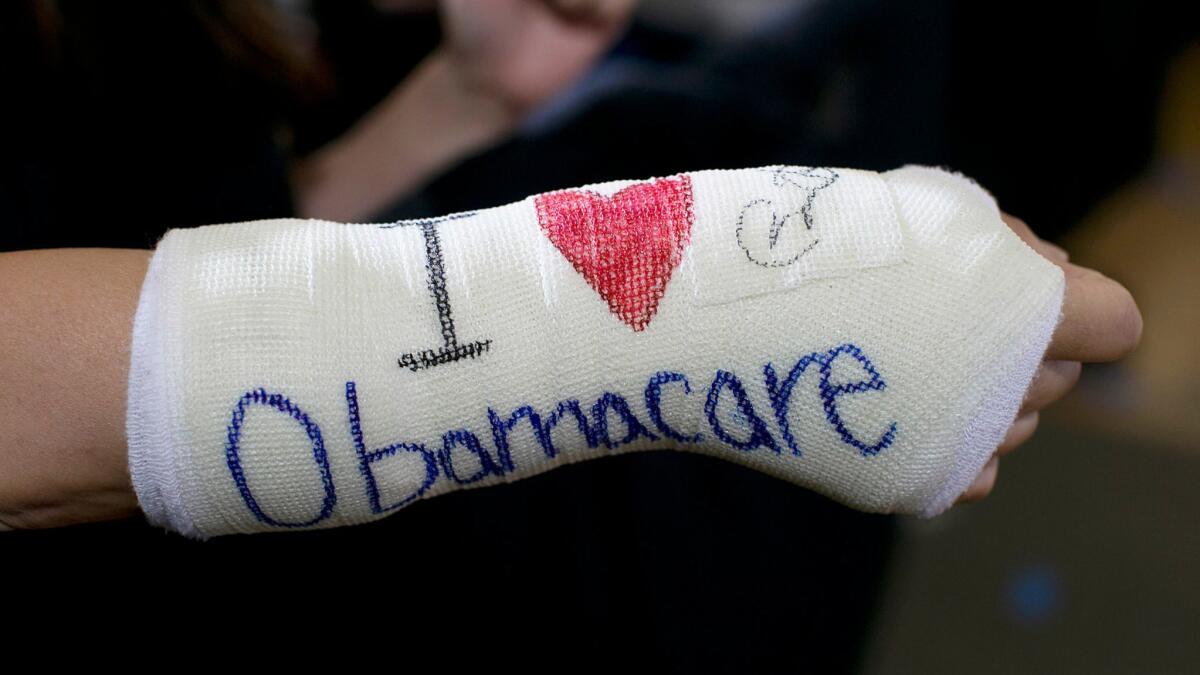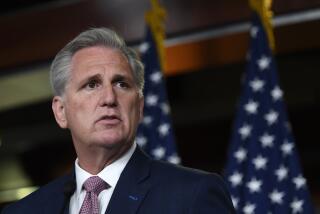Op-Ed: The boys and girls in Washington haven’t killed Obamacare yet

It was a pretty good year for President Obama’s major legacy, healthcare reform, aka Obamacare or the Affordable Care Act. The pace of new signups has been respectable if not miraculous, and now Republicans in Congress have decided (correctly) that perhaps total war against Obamacare is not their wisest strategy.
People seem to like the ACA. They especially like the provision forbidding insurers to discriminate against those with preexisting conditions. This formerly obscure technical term of the insurance business has become the center of the healthcare discussion. You can’t call it a debate, because there’s no basic disagreement. Everyone’s for covering preexisting conditions. The question is, Who got there first?
Healthcare is now like Social Security, the famous “third rail of American politics” — that is, the one that will kill you if you touch it, like the third rail of the New York subway. (What? The subway has no fourth rail? Relax. It’s only a metaphor.) So Republicans are claiming, preposterously, that their many attempts to kill Obamacare — both before and after its enactment — were actually attempts to improve it.
Republicans are claiming, preposterously, that their many attempts to kill Obamacare were actually attempts to improve it.
Imagine walking into an insurance company office, or maybe you go online to log in to one of those “exchange” thingummies that Obamacare encourages the states to start. You have a rare tropical disease that can only be held at bay by an equally rare drug costing $200,000 a year. (The number and situation are made up, but not unrealistic.) Before Obamacare, insurance companies and plans could have said no to you. They could cherry-pick their customers, taking only the ones they wanted. The more you needed medical insurance, the less likely you were to be able to get it.
Democrats — quite unfairly — have used the preexisting conditions question to make insurance companies look like bad guys. But they aren’t. The insurance companies are not behaving like heartless monsters. They are behaving like insurance companies. As long as preferring healthy, inexpensive customers to cheap and sick ones was legal, they’d have been crazy — and possibly violating their fiduciary duty to stockholders — if they didn’t discriminate against people with preexisting conditions.
Democrats believe they solved the preexisting-conditions problem by simply forbidding discrimination against people with preexisting conditions. This sounds easier than actually doing it will be.
Enter the Fray: First takes on the news of the minute from L.A. Times Opinion »
There are all sorts of ways, subtle or otherwise, that a salesperson can discourage a sale without overt discrimination. She could frown, or dress like a slob or merely smell bad, but the effect would be the same as discrimination. Likewise an insurance company. To use a well-known example, suppose the insurance company just happens to put all of its sales offices on the second floors of buildings without an elevator. No one in a wheelchair need apply. Or suppose it keeps the doctors with the highest ratings out of its network.
Even if a company plays it straight and doesn’t try to game the system, a so-called insurance “death spiral” can develop. If enough young healthy types buy cheap plans (with less coverage), less money goes into the pot to cover those who need care. And the whole edifice swivels into a dark hole.
Obamacare assumes that money-in from healthy people will be more than enough to balance the money-out for the high cost of people with health problems — preexisting conditions. But there is no guarantee of this. In fact, it was always pretty unlikely that Obamacare would actually generate a profit.
But go ahead, boys and girls of Congress. Have your fun. And when you decide to get serious, maybe we can have single-payer.
Michael Kinsley is a contributing writer to Opinion.
Follow the Opinion section on Twitter @latimesopinionand Facebook
More to Read
A cure for the common opinion
Get thought-provoking perspectives with our weekly newsletter.
You may occasionally receive promotional content from the Los Angeles Times.






